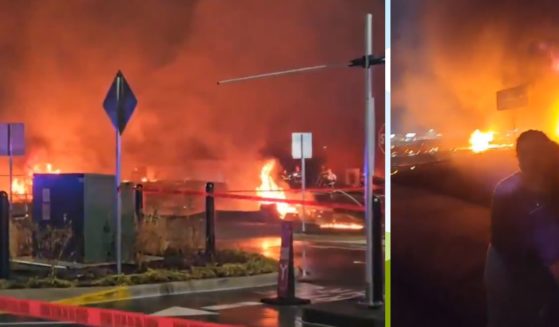Pentagon Chiefs Now Get Chilling Response When They Call China
China’s top military officials have erected a wall of silence between them and their American counterparts, according to a new report.
China had promised retribution if House Speaker Nancy Pelosi visited Taiwan and thundered its anger in military exercises around the self-governing island after Pelosi left. On Friday, China said it would stop dialogue with American officials in a number of areas.
However, even before that, Chinese military leaders had severed any connection with America by refusing to take calls from U.S. officials, according to Politico, which cited as its source “three people with knowledge of the attempts.”
China’s new 8 measures against US:
1 No more communication btwn military theatre leaders
2 No more Ministries of Defence working meetings
3 No more maritime security dialogues
4 No more illegal migrant repatriation
5 No more criminal justice assistance
6 No more climate talks pic.twitter.com/SNZLk93B0x— Stuart Lau (@StuartKLau) August 5, 2022
Some observers worry that the lack of communication at a time when both Chinese and American warships are operating in the South China Sea could lead to unintended consequences including an escalation from threats to hostilities.
“If the [Chinese military] is operating more aggressively, and in closer proximity to U.S. forces with greater frequency, we’d need these mechanisms even more to promote a safe operating environment,” Randy Schriver, top Pentagon official for Asia policy in the Trump administration, said.
Joint Chiefs Chair Gen. Mark Milley last spoke to Chinese Chief of the Joint Staff Gen. Li Zuocheng, on July 7, according to the Pentagon. Defense Secretary Lloyd Austin met Chinese Defense Minister Gen. Wei Fenghe in June.
“The secretary has repeatedly emphasized the importance of fully open lines of communication with China’s defense leaders to ensure that we can avoid any miscalculations, and that remains true,” Todd Breasseale, acting Defense Department press secretary, said.
White House spokesman John Kirby said although China’s action in stepping away from existing talks “does not completely eliminate the opportunities for senior members of our military to talk,” it increases the risk of a flareup that becomes widespread.
“These lines of communications are actually important for helping you reduce the risk of miscalculation and misperception,” Kirby said. “You have this much military hardware operating in confined areas, it’s good, especially now, to have those lines of communication open.”
Some said China’s action is part of how it treats nations when things go wrong.
“Historically this is definitely part of the playbook,” Schriver said. “Mil-mil [communications] historically is on the chopping block when we have problems with China.”
Kirby called China’s action “irresponsible” as tensions were high.
“We find the shutting down of military communications channels at whatever level and whatever scope and at a time of crisis to be an irresponsible act,” Kirby said.
Christopher Twomey, a security scholar at the U.S. Naval Postgraduate School in California, agreed, according to Reuters.
“This increased density of forces, in the context of an intensifying crisis, raises the prospect for inadvertent escalation that neither side wants,” Twomey said, noting he spoke for himself, not the school.
“That is precisely the time you would want to have more opportunities to talk to the other side … Losing those channels greatly reduces the ability of the two sides to de-conflict military forces as various exercises and operations continue,” he said.
Truth and Accuracy
We are committed to truth and accuracy in all of our journalism. Read our editorial standards.
Advertise with The Western Journal and reach millions of highly engaged readers, while supporting our work. Advertise Today.












